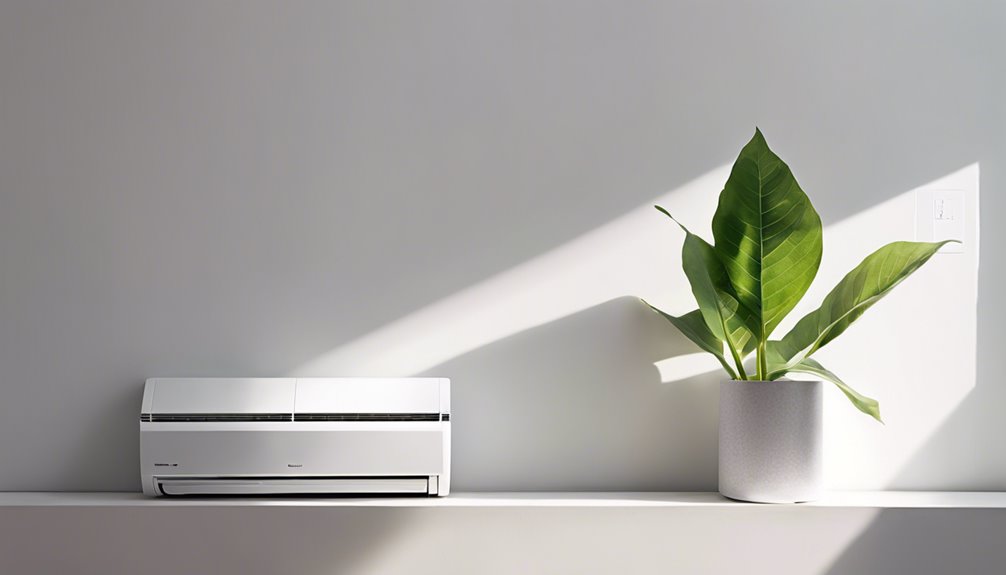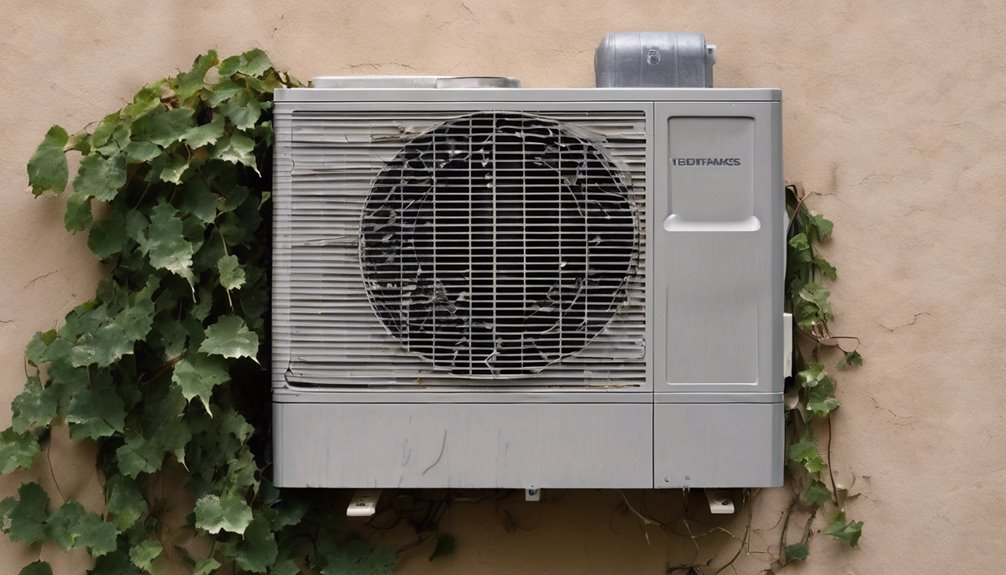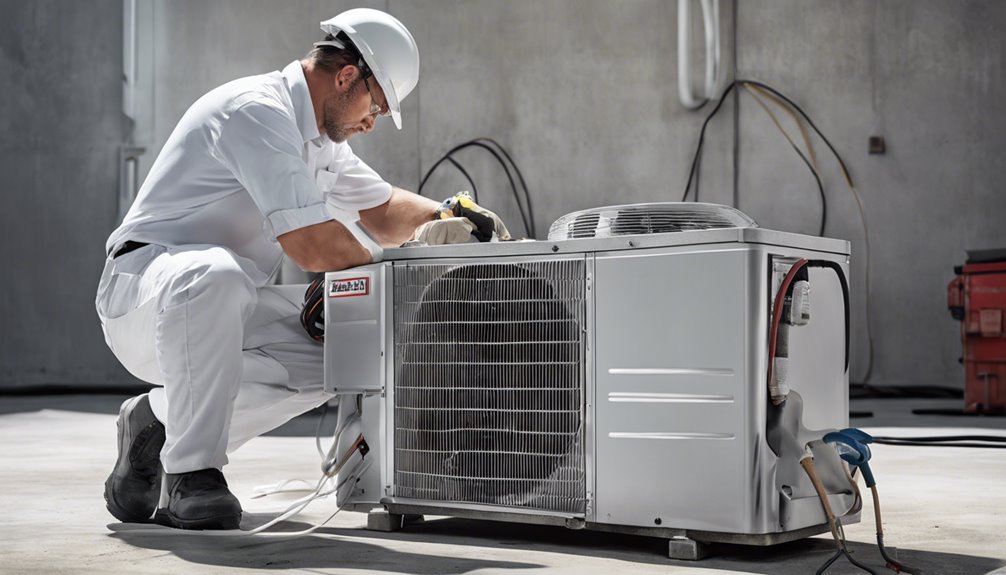You can significantly extend the lifespan of your central air conditioning unit and keep it running efficiently by following a few simple yet crucial maintenance tasks. Replace air filters every 1-3 months, inspect and clean coils regularly, check refrigerant leaks and levels, ensure proper drainage and water flow, and lubricate moving parts and check belts. By staying on top of these tasks, you'll not only reduce your energy bills but also improve indoor air quality – and that's just the beginning of what you can learn to get the most out of your central AC.
Key Takeaways
- Replace air filters every 1-3 months to ensure cleaner air circulation, efficient AC performance, and reduced energy bills.
- Inspect and clean coils regularly to maintain efficient airflow, prevent damage, and extend the AC's lifespan.
- Check refrigerant leaks and levels annually to prevent damage, environmental harm, and ensure optimal AC performance.
- Ensure proper drainage and water flow by inspecting the condensate drain line, drainage system, and verifying water flow annually.
- Lubricate moving parts and check belts annually to prevent wear and tear, and ensure the AC runs smoothly and efficiently.
Replace Air Filters Regularly
Replacing your central AC's air filters regularly is a simple yet crucial maintenance task that can significantly impact your system's performance and your indoor air quality.
You'll breathe easier knowing you're getting the best air purification possible. Using high-quality filters ensures cleaner air circulating throughout your home.
Low-quality filters can't capture small particles, allowing them to circulate and aggravate respiratory issues.
Change your filters every 1-3 months, depending on usage and filter quality. Don't wait until you notice a decline in performance or musty odors.
Stay on top of filter replacements to keep your AC running efficiently and your air clean. By doing so, you'll enjoy improved air purification, reduced energy bills, and a longer-lasting system.
Inspect and Clean Coils
You'll want to give your central AC's coils some attention to ensure they're running efficiently.
Dirty coils can increase your energy bills and even lead to system breakdowns, so it's essential to inspect and clean them regularly.
Now, let's take a closer look at the best methods for cleaning your coils and what to check for during your inspection.
Coil Cleaning Methods
When your central AC is running efficiently, it's easy to take its performance for granted. But neglecting coil maintenance can lead to reduced airflow, increased energy bills, and even system failure. You'll want to clean your coils regularly to ensure optimal performance.
Here's a breakdown of coil cleaning methods:
| Method | Description | Effectiveness |
|---|---|---|
| Garden Hose | Spray the coils gently with a garden hose to remove loose debris. | 6/10 |
| Coil Brush | Use a soft-bristled brush to remove dirt and dust from the coils. | 7/10 |
| Mild Detergent | Mix a mild detergent with water and spray it onto the coils. Let it sit before rinsing. | 8/10 |
| Compressed Air | Use compressed air to blow away dirt and debris from the coils. | 5/10 |
| Professional Cleaning | Hire a professional to deep clean your coils with specialized equipment. | 10/10 |
Remember to consider your coil design when choosing a cleaning method, as some may be more suitable for your system than others. Regular coil maintenance is crucial to extending the lifespan of your central AC.
Coil Inspection Checklist
About every 1-3 months, inspect your central AC coils to ensure they're clean and free of debris.
Start by checking the coil design and placement. Are they easily accessible or hidden behind walls or furniture? Take note of any obstructions that might hinder airflow.
Next, visually inspect the coils for dirt, dust, or other contaminants. Look for signs of rust or corrosion, and check for any bent or damaged fins. Use a flashlight to illuminate hard-to-see areas.
If you notice any issues, it's time to clean your coils. Remember, a clean coil is essential for efficient airflow and optimal AC performance.
Check Refrigerant Leaks and Levels
You'll want to identify and address any refrigerant leaks to prevent damage to your AC unit and the environment.
To do this, you'll need to familiarize yourself with common leak detection methods, such as using specialized tools or inspecting for signs of refrigerant residue.
Additionally, you should also know how to check refrigerant levels to ensure they're within the recommended range for optimal performance.
Leak Detection Methods
Refrigerant leaks and low levels can significantly impede your central AC's performance, leading to increased energy bills, reduced airflow, and even system failure.
To detect these leaks, you'll need to employ some advanced methods. One approach is to use acoustic sensors, which can pick up the hissing sound of refrigerant escaping from your system.
Another option is to conduct ultrasonic tests, which can detect the high-frequency noise produced by refrigerant leaks. These methods allow you to pinpoint the source of the leak, making it easier to fix the issue and get your AC running efficiently again.
Refrigerant Level Checks
Regular checks of your central AC's refrigerant levels are crucial to ensure it operates efficiently and effectively.
Low refrigerant levels can lead to reduced system performance, increased energy bills, and even equipment failure. You should check your refrigerant levels at least once a year, ideally before the peak summer season.
- Know your refrigerant type: Ensure you're using the correct refrigerant type for your AC unit, as specified in the user manual.
- Use a gauge: Attach a pressure gauge to the low-side port to measure the refrigerant pressure.
- Compare to specs: Check the pressure reading against the manufacturer's specifications to determine if it's within the recommended range.
- Look for signs of leaks: Inspect the system for signs of refrigerant leaks, such as ice buildup or hissing sounds.
Ensure Proper Drainage and Water Flow
Proper drainage and water flow are crucial components of your central air conditioner's operation. If not maintained, water damage can occur, leading to costly repairs and even mold growth.
| Task | Frequency |
|---|---|
| Check condensate drain line for blockages | Monthly |
| Inspect drainage system for leaks | Quarterly |
| Clean condenser coils to ensure airflow | Semi-annually |
| Verify water flow into drainage system | Annually |
Lubricate Moving Parts and Check Belts
Now that you've ensured your central AC's drainage system is functioning correctly, it's time to focus on the mechanical components that keep your system running smoothly.
Lubricating moving parts and checking belts is crucial to prevent wear and tear. You'll need to use the right motor oil type for your system, as specified in your user manual.
Here's what to check:
- Motor bearings: Look for signs of wear, such as excessive noise or vibration, and apply the recommended lubricant.
- Blower motor: Check the belt tension and lubricate the motor bearings as needed.
- Compressor: Ensure the crankcase heater is working correctly and lubricate the compressor bearings.
- Fan motor: Inspect the belt and motor bearings for signs of wear, and apply lubricant as necessary.
Schedule Professional Maintenance
Your central AC system requires more than just DIY maintenance to run efficiently and effectively. It's essential to schedule professional maintenance to catch potential issues before they become major problems. This not only saves you money on maintenance costs but also ensures your system operates at its best.
| Scheduling Priorities | Benefits |
|---|---|
| Pre-Season Check | Identify potential issues before peak usage |
| Regular Filter Cleaning | Improve air quality and system efficiency |
| Coil Cleaning | Enhance heat transfer and reduce energy bills |
| System Inspection | Detect and fix problems before they become costly |
Frequently Asked Questions
Can I Use a Dehumidifier With My Central AC?
If you live in a humid climate, you're probably wondering, "Can I use a dehumidifier with my central AC?" Yes, you can! Running a dehumidifier alongside your AC can enhance its performance, reduce energy bills, and provide dehumidifier benefits like improved indoor air quality.
How Often Should I Inspect My Ac's Electrical Connections?
You should inspect your AC's electrical connections every 6-12 months to prevent faulty wiring and connection corrosion, which can lead to safety hazards, system failures, and increased energy bills.
What Is the Ideal Thermostat Temperature for Energy Efficiency?
You're aiming for summer comfort while maximizing energy savings; set your thermostat to 78°F when you're away or sleeping, and 75°F when you're home, as this sweet spot balances comfort and energy efficiency.
Can I Repair My AC Myself or Do I Need a Pro?
You're wondering if you can fix your AC on your own or need a pro's help. Know your DIY limitations and prioritize repairs: simple tasks like filter changes are okay, but complex issues like refrigerant leaks require a professional's expertise.
Do I Need to Turn off My AC When I'm on Vacation?
When you're heading out on vacation, you're probably wondering if you need to turn off your AC. Yes, you should! Consider putting it in vacation mode or setting an auto shutdown to save energy and prevent unexpected issues while you're away.
Conclusion
You've made it through the expert tips to maintain your central AC! By replacing air filters regularly, inspecting and cleaning coils, checking refrigerant leaks and levels, ensuring proper drainage and water flow, lubricating moving parts and checking belts, and scheduling professional maintenance, you'll be well on your way to a cooler, more efficient summer. Stay on top of these tasks to keep your AC running smoothly, saving you money and stress in the long run.



